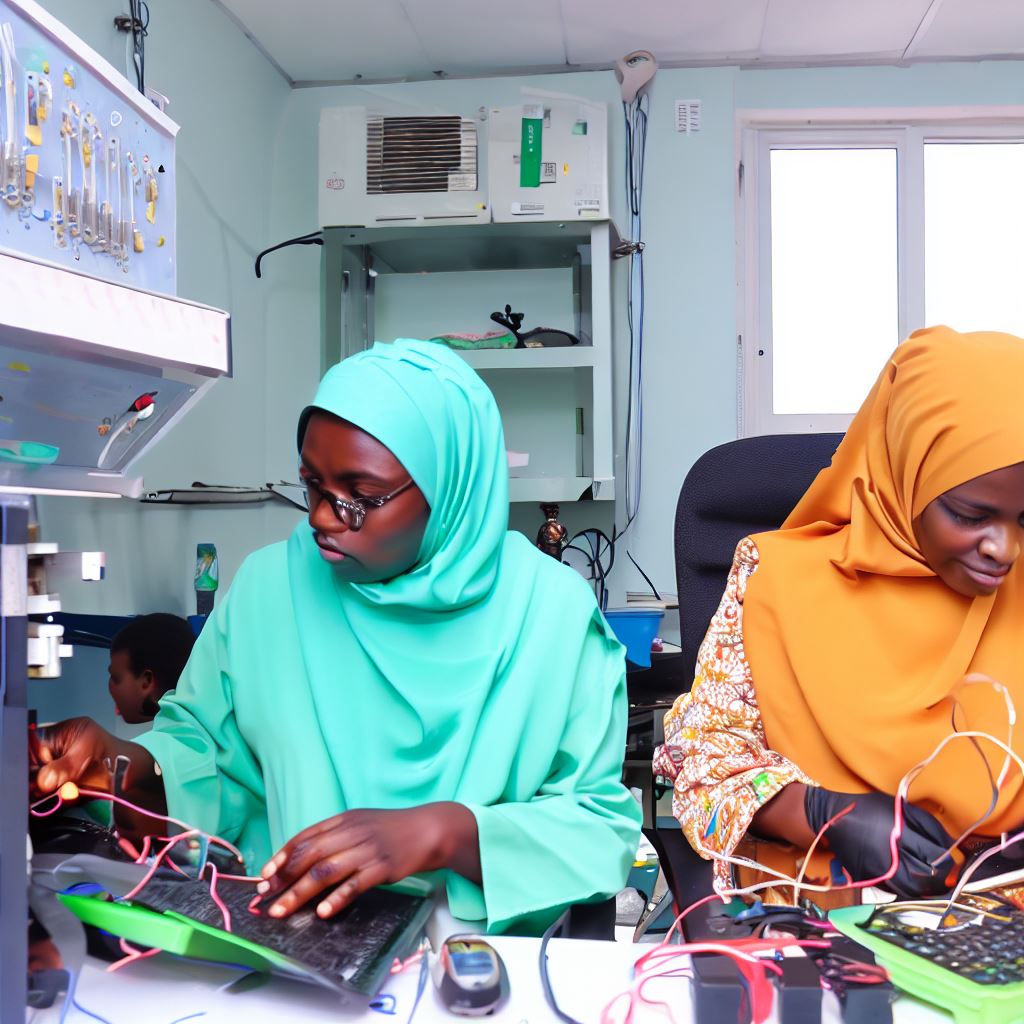Introduction
Photonics studies light’s properties and interactions with matter, transforming various industries, like telecoms, healthcare, and energy.
Nigeria’s recent interest in photonics addresses societal challenges—energy efficiency, healthcare, and telecom infrastructure.
Energy efficiency concerns in Nigeria drive interest in photonics; solar cells and LEDs offer sustainable energy solutions.
Photonics enhances healthcare with non-invasive techniques like optical imaging, ensuring accurate diagnoses and personalized treatments.
Photonics benefits telecommunications by using optical fibers to improve connectivity and data transmission.
Generally, photonics holds great potential for Nigeria, addressing energy, healthcare, and telecom challenges, fostering sustainable development and growth.
Overview of Photonics in Nigeria
Discuss the development and current state of photonics research in Nigeria
Photonics is a field of science that deals with the manipulation of light for various applications.
In recent years, Nigeria has seen significant progress in the development of photonics research.
Limited Resources
Unfortunately, the development of photonics in Nigeria has been impeded by the lack of adequate resources. This includes funding, advanced equipment, and trained personnel.
Government Support
Despite these challenges, the Nigerian government has shown commitment to the advancement of photonics.
Efforts have been made to establish research centers and provide funding for research projects.
Research Institutions
Several research institutions in Nigeria are actively involved in photonics research.
These institutions conduct research in various subfields of photonics, such as optical communication, laser technology, and photovoltaics.
Collaboration and Networking
Collaboration and networking play a crucial role in the development of photonics research in Nigeria.
Nigerian researchers have been actively engaging with international partners and attending conferences and workshops to enhance their knowledge and skills.
Application Areas
Photonics research in Nigeria has focused on areas such as telecommunications, energy, healthcare, and agriculture.
Researchers are exploring innovative ways to utilize photonics technology to solve challenges specific to Nigeria.
Highlight the achievements and contributions of Nigerian researchers in the field
Nigerian researchers in the field of photonics have made remarkable achievements and contributions.
Despite the limited resources, they have demonstrated their ingenuity and expertise.
Publications and Patents
Nigerian researchers have published numerous research papers in reputable international journals, showcasing their findings and advancements in photonics.
Additionally, they have obtained patents for innovative technologies developed in Nigeria.
Solar Energy Solutions
One of the notable achievements of Nigerian researchers is the development of solar energy solutions using photonics.
They have designed and implemented solar panels that harness solar energy effectively, contributing to renewable energy solutions.
Telecommunications Advancements
Nigerian researchers have also made significant contributions to the field of telecommunications through photonics.
They have developed optical communication systems that enhance data transmission speed and reliability.
Medical Photonics
In the medical field, Nigerian researchers have utilized photonics technology to improve diagnosis and treatment.
They have developed optical imaging techniques that aid in early detection of diseases, facilitating prompt medical intervention.
Capacity Building
Nigerian researchers are actively involved in capacity building initiatives to enhance the skills and knowledge of young scientists in photonics.
They organize workshops, mentorship programs, and training sessions to bridge the knowledge gap.
Basically, although Nigeria faces challenges in the development of photonics research, significant progress has been made.
The government’s support, collaboration efforts, and achievements of Nigerian researchers highlight the potential of photonics to address local challenges and contribute to scientific advancements globally.
With continued investment and resource allocation, Nigeria can further enhance its position in the field of photonics research.
Read: The Importance of Photonics in Nigeria’s Health Sector
Lack of Infrastructure and Funding
Challenges faced in establishing photonics research centers in Nigeria
- Inadequate availability of suitable facilities and equipment.
- Limited access to advanced technology and instrumentation.
- Shortage of skilled technicians and researchers trained in photonics.
- Insufficient collaboration between academia and industry for research development.
Inadequate funding and government support for photonics research
- Limited financial resources allocated to photonics research projects.
- Inconsistent and unpredictable funding from government agencies.
- Lack of awareness among policymakers about the importance of photonics.
- Insufficient support for research grants and scholarships in the field.
- Dearth of funding for infrastructure development and maintenance.
How the lack of infrastructure and funding hinders progress in the field
- Restricts the establishment of advanced research facilities and laboratories.
- Curbs the acquisition of state-of-the-art equipment and technology for cutting-edge research.
- Limitations in conducting experiments and data collection to validate theories and concepts.
- Reduces opportunities for collaboration and knowledge exchange with international experts.
- Stunts the growth of skilled researchers and hampers the overall development of photonics in Nigeria.
In essence, the challenges related to the lack of infrastructure and funding in photonics research in Nigeria are substantial.
The absence of proper facilities, equipment, and financial support hinders the establishment and growth of research centers in the field.
Inadequate funding, both in terms of financial allocation and government support, further exacerbates the situation.
Without sufficient infrastructure and funding, progress in photonics research remains limited, leading to a missed opportunity for scientific advancements and industrial applications.
To overcome these challenges, it is crucial for the Nigerian government and relevant stakeholders to recognize the importance of photonics, allocate adequate resources, and establish strong partnerships with international institutions to foster development in the field.
Read: Job Trends: Photonics Specialist Roles in Nigeria
Brain Drain and Talent Retention
Discuss the issue of talented Nigerian researchers leaving the country for better opportunities
- Nigeria has been experiencing a significant brain drain as talented researchers are leaving the country.
- The lack of adequate funding and infrastructure in Nigeria’s scientific research institutions is a major factor.
- Nigerian researchers often find better opportunities abroad, where they can access state-of-the-art facilities and funding.
- The allure of competitive salaries, better working conditions, and career growth prospects lures Nigerian researchers away.
- This brain drain deprives Nigeria of the expertise and knowledge that could contribute to its scientific and technological advancement.
- Whenever talented researchers leave, it creates a negative impact on the local research ecosystem.
- The departure of skilled researchers contributes to a loss of human capital and hampers the development of the field of photonics in Nigeria.
Highlight the need for strategies to retain skilled professionals in the field of photonics
- Retaining skilled professionals is crucial to foster an environment of growth and innovation in photonics.
- One strategy is to improve the funding for research institutions in Nigeria, ensuring they have adequate resources.
- Creating a supportive and inclusive work environment that values the contributions of researchers can enhance retention.
- Establishing collaborations and partnerships with international organizations can provide exposure and development opportunities.
- Offering competitive salaries and benefits can incentivize talented researchers to stay in Nigeria.
- Providing opportunities for career advancement, such as training programs, conferences, and workshops, is essential.
- Developing mentoring programs where experienced professionals guide and support younger researchers can also foster retention.
- Engaging in continuous dialogue with researchers to address their concerns and needs is crucial.
- Establishing policies that encourage partnership between academia and industry can create employment opportunities.
- Encouraging researchers to publish their work in reputable international journals can enhance their visibility and recognition.
In fact, the brain drain of talented Nigerian researchers is a significant challenge for the field of photonics in Nigeria.
However, with the implementation of effective strategies, it is possible to retain skilled professionals and create an environment conducive to growth and innovation in photonics.
Adequate funding, collaborative partnerships, supportive work environments, career advancement opportunities, and policy reforms are essential in addressing this issue.
Retaining talented researchers is crucial for the scientific and technological development of Nigeria.
Read: Challenges Faced by Librarians in Nigeria: Analysis

Find Out More: Nigeria’s Hydrology Industry: Opportunities and Challenges
Importance of Education and Collaboration
Explain the need for improved photonics education at Nigerian universities
- Nigerian universities should focus on improving photonics education to meet the challenges in the field.
- Current photonics education in Nigeria lacks practical skills and advanced curriculum.
- Improved photonics education will equip students with the necessary knowledge and skills for the industry.
- Nigerian universities should collaborate with industry experts to develop relevant photonics curriculum.
- Advanced photonics education will promote innovation, research, and development in Nigeria.
- Offering specialized courses and training programs will attract more students to pursue photonics as a career.
- Improved photonics education will help bridge the technological gap between Nigeria and other developed countries.
- Photonics education should integrate practical training and hands-on experience to prepare students for real-world challenges.
- Collaborations between Nigerian universities and international institutions will enhance photonics education.
- Strengthening photonics education will promote economic growth by fostering a skilled workforce in Nigeria.
Discuss the potential benefits of international collaborations in photonics research and development
- International collaborations in photonics research will bring diverse perspectives and expertise.
- Collaborations will enhance knowledge exchange and sharing of best practices in photonics.
- Nigerian researchers can leverage international collaborations to access advanced facilities and equipment.
- Interaction with international experts will boost the quality and impact of research in photonics.
- International collaborations will allow Nigerian researchers to participate in global photonics conferences and workshops.
- Joint research projects will foster innovation in photonics and encourage technological advancements in Nigeria.
- Collaborations will enable Nigerian researchers to learn from successful photonics programs in other countries.
- Partnering with international institutions will facilitate funding opportunities for photonics research in Nigeria.
- International collaborations will help Nigerian researchers stay updated with the latest trends and developments in photonics.
- Collaboration with international partners will strengthen the reputation of Nigerian universities in the field of photonics.
In short, improving photonics education at Nigerian universities is crucial for addressing the challenges in the field.
By enhancing the curriculum, integrating practical training, and collaborating with industry experts and international institutions, Nigerian universities can produce skilled photonics professionals and contribute to research and development in the field.
International collaborations in photonics research and development will bring numerous benefits, including knowledge exchange, access to advanced facilities, and increased funding opportunities.
It is imperative for Nigeria to prioritize education and collaboration in photonics to foster innovation and propel economic growth in the country.
Read: Photonics in Agriculture: A Nigerian Overview
Overcoming Challenges and the Way Forward
Measures to Overcome Challenges in Photonics Research in Nigeria
- Establishing dedicated research funding for photonics projects to attract and retain talented researchers.
- Enhancing collaboration between academia, industry, and government institutions to facilitate knowledge transfer and resource sharing.
- Investing in state-of-the-art research facilities and equipment to support cutting-edge photonics research.
- Promoting international partnerships and collaborations to leverage expertise and access to advanced technologies.
- Offering incentives and grants for promising photonics startups and entrepreneurs to drive innovation and technology commercialization.
- Developing specialized training programs and workshops to build a skilled workforce in photonics.
- Providing mentorship and career development opportunities for young researchers to encourage their participation in the field.
- Establishing national standards and certification processes to ensure quality control in photonics research and development.
- Conducting regular assessments and evaluations of photonics research projects to measure their impact and identify areas for improvement.
Importance of Government Policies Supporting Photonics Research and Development
- Government policies play a crucial role in driving and sustaining the growth of the photonics sector.
- Investments in photonics research can lead to technological breakthroughs, job creation, and economic growth.
- Government support can attract foreign direct investment (FDI) and encourage international collaboration.
- Policies can provide funding incentives and tax breaks to encourage private sector involvement in photonics research.
- Regulatory frameworks can protect intellectual property rights and encourage innovation in the field.
- Government initiatives can stimulate the adoption of photonics technologies in various industries, such as healthcare and telecommunications.
- Supportive policies can also promote education and skill development in photonics, ensuring a sustainable talent pool.
- Government backing can enhance the global competitiveness of Nigerian photonics researchers and industries.
Potential Socio-economic Impact of a Thriving Photonics Sector in Nigeria
- A thriving photonics sector can contribute to job creation and reduce unemployment rates in Nigeria.
- Photonics research and industries can drive technological advancements and innovation in various sectors.
- Improved healthcare diagnostics and treatments can be facilitated through the application of photonics technologies.
- Enhanced telecommunications infrastructure can enable better connectivity and communication networks.
- Photonics can play a crucial role in renewable energy generation and efficient lighting systems.
- The growth of photonics industries can attract foreign investment and boost Nigeria’s economy.
- Increased access to affordable photonics technologies can bridge the digital divide in rural areas.
- Photonics can provide solutions for environmental challenges, such as water and air quality monitoring.
- A thriving photonics sector can inspire and motivate youth to pursue careers in science and technology.
- Overall, a robust photonics industry can contribute to Nigeria’s socio-economic development and improve quality of life.
Conclusion
A major challenge in photonics from a Nigerian perspective is the lack of adequate infrastructure and funding.
Additionally, there is a scarcity of skilled personnel and limited research facilities in the field.
However, despite these challenges, there are opportunities for growth and development in photonics in Nigeria.
The country has a vast potential for utilizing photonics in sectors such as telecommunications, healthcare, and renewable energy.
Addressing these challenges is crucial for the advancement of photonics in Nigeria.
By investing in infrastructure and research facilities, as well as providing proper education and training, the field can flourish.
Moreover, addressing these challenges will stimulate economic growth, create job opportunities, and improve the overall quality of life in Nigeria.
In a nutshell, the challenges faced in photonics from a Nigerian perspective are considerable, but the potential for growth and innovation is also significant.
It is essential for the government, academia, and industry to work collaboratively in addressing these challenges to ensure the successful advancement of photonics in Nigeria.




